- Home
- Patrick Robinson
To the Death am-10
To the Death am-10 Read online
To the Death
( Arnold Morgan - 10 )
Patrick Robinson
When a terrorist bomb explodes in Boston’s Logan Airport, Admiral Arnold Morgan, the President’s most trusted advisor, moves quickly to break the cell in the United States and ship the Islamic fanatics to Guantanamo Bay. In response, the Hamas high command, meeting in a terrorist cell in Gaza, hatches a vicious plan to assassinate the Admiral the minute he leaves the United States. Morgan’s old nemesis, Ravi Rashood, leads this international attack and attempt to eliminate him. The exhilarating chase swirls through southern Ireland, London, and Scotland. Desperate to protect the Admiral at all costs, the President must summon the most dangerous Navy Seal team that the USA has to offer. This gripping and provocative thriller displays both Robinson and his hero Morgan at their peak.
Patrick Robinson
To the Death
Books by Patrick Robinson:
NOVELS
Ghost Force
Hunter Killer
Scimitar SL2
Barracuda 945
Slider
The Shark Mutiny
U.S.S. Seawolf
H.M.S. Unseen
Kilo Class
Nimitz Class
NON-FICTION
Lone Survivor (written with Marcus Luttrell)
Horsetrader: Robert Sangster and the Rise and Fall of the Sport of Kings (written with Nick Robinson)
One Hundred Days: The Memoirs of the Falklands Battle Group Commander (written with Admiral Sir John Woodward)
True Blue (written with Daniel Topolski)
Born to Win (written with John Bertrand)
The Golden Post (written with Richard S. Reeves)
Decade of Champions: The Greatest Years in the History of Thoroughbred Racing, 1970–1980 (written with Richard S. Reeves)
Classic Lines: A Gallery of the Great Thoroughbreds (written with Richard S. Reeves)
CAST OF PRINCIPAL CHARACTERS
United States Senior Command
Paul Bedford (President of the United States)
Professor Alan Brett (National Security Adviser)
Admiral Arnold Morgan (Personal Adviser to the President)
Rear Admiral George Morris (Director, National Security Agency)
Lt. Commander Jimmy Ramshawe (Assistant Director, NSA)
Vice Admiral John Bergstrom (C-in-C, SPECWARCOM)
United States Navy
Commander Rick Hunter (SEAL team leader) (recalled)
Commander Bob Wallace (USS Grabber)
CPO Mark Coulson (SEAL dive chief)
LPO Ray Flamini (SEAL diver)
Commander Hank Redford (USS Cheyenne)
CPO Skip Gowans (Sonar, USS Cheyenne)
U.S. Police Officers
Pete Mackay (Boston Police Department)
Danny Kearns (Boston Police Department)
Mike Carman (NYPD)
Joe Pallizi (NYPD)
American Travelers
Donald Martin (Boston financier)
Elliott Gardner (President, Boston corporation)
Middle East Jihadists
General Ravi Rashood (C-in-C, Hamas)
Mrs. Shakira Rashood (Hamas field agent)
Ramon Salman (Boston-based Hamas chief)
Reza Aghani (Boston terrorist)
Mohammed Rahman (Palm Beach insurgent)
Commodore Tariq Fahd (First Minister, Hamas)
Major Faisal Sabah (2/IC, Hamas, Gaza)
Colonel Hassad Abdullah (Hamas field officer)
Fausi (Jordanian attaché/chauffeur)
Ahmed (Jordanian embassy cultural attaché/spy)
Captain Mohammed Abad (CO, Iranian submarine)
Lieutenant Rudi Alaam (Navigation Officer, Iranian submarine)
National Air Traffic Control
Steve Farrell (Radar Operator)
Northeastern Air Defense
Colonel Rick Morry
Major Scott Freeman
Washington Writers
Anthony Hyman (White House Presidential Staff)
Henry Brady (Washington Post)
Israeli Personnel
Ambassador David Gavron
Colonel Ben Joel (Mossad team leader)
Lt. Colonel John Rabin (Explosives Chief)
Major Itzaak Sherman (Israeli patriot)
Abraham (Bodyguard and hitman)
Brockhurst, Virginia
Emily Gallagher (Mother of Mrs. Arnold Morgan)
Jim Caborn (Manager, Estuary Hotel)
Detective Joe Segel (Murder inquiry)
Matt Barker (garage owner) (dec.)
Fred Mitchell (Doorman, Chesapeake Heights)
Ireland
Detective Superintendent Ray McDwyer (Skibbereen Police) Officer Joe Carey
Jerry O’Connell (West Cork farmer) (dec.)
Patrick O’Driscoll (Central Milk Corporation)
Mick Barton (Shamrock Café, Skibbereen)
Bill Stannard (Captain, Yonder, Crookhaven)
London
Reggie Milton (Dover Street doorman)
George Kallan (Admiral Morgan’s bodyguard) (dec.)
Al Thompson (Chief bodyguard)
Scotland
Admiral Sir Iain and Lady MacLean
CHAPTER 1
Logan International Airport, which sits atop a zillion-ton concrete promontory, hemmed in by runways, tunnels, and the harbor, was heaving with travelers. Thousands of them, packed into lines for tickets, lines for check-in, lines for security, lines for coffee, coke, donuts. They even had lines for cheeseburgers, and it was not yet 8 A.M. on a gloomy, freezing January morning.
South. South. The demand was always south. South to Florida. South to Antigua, Barbuda, St. Barts, south to the islands, any island, anywhere to get the hell out of this cold, snow, sleet, and ice. It was the peak of the season. High fares. Ruinous hotel bills. Nobody cared. This was the ice-bound airport of the winter-grim northeastern city of Boston, Massachusetts. Beyond the departure terminals, a bitter easterly wind howled straight off the slate-gray waters of Massachusetts Bay. A mile to the west stood the frozen granite towers of the downtown area.
All this had once been home to a battle-hardened race of New En-glanders who accepted the cold, fought it, and shrugged it off. Not any more. Modern prosperity, air travel, and a sense of indignation and entitlement pervaded. Goddammit, I don’t need this tundra crap. Get me out of here.
Thus the eager vacationers collided in a tidal surge with the already-irritated business crowd, which was, en masse, fed up with late takeoffs. As Monday mornings go, this one was up and running.
“This is totally fucking crazy,” muttered Officer Pete Mackay, adjusting his gloved hands on his light machine gun as he moved through the crowd.
“Tell me about it,” said his teammate, Officer Danny Kearns. “Osama bin Asshole could vanish without a trace in the freakin’ donut queue.”
Mackay and Kearns were buddies beyond the confines of the Boston Police Department. Each of them brought a missionary zeal to the fan base of the New England Patriots. For almost eleven months of every year, and sometimes for twelve, they believed to the depths of their souls that this year was theirs, that the glorious years of Super Bowl victories would stand before them again.
They lived football. They ate and slept football. Each of them would awake in the night, leading the blitz as the Patriots surged forward; the big, bullnecked Pete Mackay, in his dreams the greatest defensive lineman who ever lived; Danny, more modestly, the fastest running back on earth. Whenever they could, they went to the games together, taking turns bringing the kids, Pete’s Patrick and Sean, Danny’s Mikey and Ray.
Both cops were fifth-generation Boston Irish; they both lived
on the south side of the city, across the water from the airport. And their great-great-grandparents had emigrated from Ireland around the same time, right after the famine. No one could remember when the Mackays and the Kearnses did not know each other. Both Pete’s and Danny’s fathers had been Boston cops.
The whole lot of them had attended the same grade school in Southie, played football together, played baseball together in the streets, got in fights with their neighbors, and endured a cheerful scrappy childhood. Pete and Danny both made it to Boston University, and both played football — though not at the highest level, however much effort they put in.
Subsequently, both men viewed the Patriots with a kind of stricken pride, a complicated self-irony that burst into an unreasoning, inflamed passion when the Barbarians were at the gate — that is, when any other team from any other city in the United States challenged the boys from Foxborough.
As a cop, the 34-year-old Pete Mackay was scheduled to go right to the top. He was ambitious, tough, and cynical, though not unreasonably. In action, he was still fast on his feet and a master at dealing with the occasional outbreak of inner-city violence. Like Danny, he was an expert marksman. Also, he packed a right hook like a jackhammer, should anyone be foolish enough to attack him.
Officer Kearns, the resident comedian of the precinct, was not quite so dedicated to the police department. He had a very beautiful Italian wife, Louise, and by the end of most days he was about ready to call it quits and get home to the family. His straight man, Pete, also had a pretty wife, Marie, but he was always looking around for crimes to investigate, chatting with the detectives, moving steadily toward the day when he would become Detective Sergeant Mackay.
They were a popular team, Mackay and Kearns, and they both spent a lot of extra hours raising funds for the families of police officers killed or injured in action.
This morning, in the jostling hub of the airport’s Terminal C, they were on high alert for anything that looked even remotely suspicious. Normally they patrolled slowly, moving from one end of the terminal to the other but never straying too far from the sightline of the security staff.
This morning it was more difficult, owing to the sheer volume of passengers. The shouts of the airline staff rose above the throng—This way, sir. I’m sorry, sir — right to the end of that queue right there. We’re moving it along, sir, just as fast as we can. just keep moving along. keep moving right along.
“Jesus, Pete,” said Danny. “I was in Greece one time, and they treated herds of fucking billygoats better’n this.”
Pete Mackay laughed, like always at Danny’s humor. But then the innate Boston cop on terrorist alert took over. “Yeah, but this is serious. We couldn’t hardly move if anything happened. I been trying to calculate, maybe a full half-minute from here to get to the security guys — unless we knock down a coupla dozen passengers.”
“You mean like Ryman against the Steelers last month — that time he took three defensive linemen with him — hell! That was some play.”
“I guess that’s the kind of thing — a head-down rush. But seriously, these are tough operating conditions, and we have to stay in view of the passengers and staff.”
“Sure as hell be better if we could move a coupla feet without crashing into someone.”
The two police officers tried to move along toward the head of the queue, but turned back. “Just don’t want to get out of sight of security, that’s all,” said Mackay.
Donald Martin was the junior vice president of a Boston brokerage house, and he was doing his level best to clear the new passport control system and get on a flight to Atlanta. He had no baggage and expected to be back home in Newton, west of Boston, by midnight.
He was traveling with the president of his corporation, a silver-haired financier, a Boston Brahmin named Elliott Gardner, thirty years his senior. Donald was quietly reading the Globe; his boss was staring somewhat aimlessly into the distance, bored sideways by the airport procedures, unamused that their first-class tickets did not allow them to bypass this unattractive closeness to the rank and file. Particularly as the queue had come to a tiresome halt.
Behind them stood one passenger, apparently alone, and behind him was a family, two very young children presumably with mom and dad. They had a lot of baggage piled on a cart. One child was screaming. Elliott Gardner hoped to god that the family was not traveling first-class on Delta to Atlanta.
“WA-HAAAAAH!” wailed the child. “Jesus Christ,” muttered Elliott Gardner. And then he felt a mild tap on the shoulder. The passenger behind him was making contact. He turned around and came face-to-face with a youngish man, well dressed, no more than thirty, of decidedly Middle Eastern appearance. He could have been Turkish or Arabian, but not Jewish or even Israeli. This was a face born and bred in desert or casbah.
The man smiled broadly. “Excuse me, sir,” he said. “I have two quite heavy briefcases here, and I’m just going over there to Starbucks for some coffee. Would you mind keeping an eye on one of them for me — kick it along if the queue moves?”
Elliott glanced down at the brown leather briefcase on the floor. A well-mannered man, unaccustomed to rudeness, he replied, “No problem. Leave it right there.”
Donald Martin absent-mindedly looked up from his newspaper and asked, “What did he want?”
“Oh, just to watch his briefcase while he went for coffee — he’s over there, heading for Starbucks. Guess I should have had him get some for us, since the goddamned queue has stalled.”
“Where is he?” said Martin, suddenly alert.
“Just over there at the Starbucks counter.”
“What’s he wearing?”
“Some kind of tan-colored jacket, I guess.”
Martin swung around and pointed, “You mean him, that guy moving down the hallway, against the crowd?”
“Yeah, dark hair, that’s him. What’s up, Don?”
“Well, he just walked straight past Starbucks, for a start.”
“Probably going to take a leak,” replied Elliott.
“Well, he just broke every rule in the book, about leaving luggage unattended. And so did you. You have no idea what’s in that briefcase. AND the guy looks like a fucking Arab.”
Elliott Gardner looked startled at this apparent brush with a dangerous corner of the outside world. And his very junior vice president threw his right arm in the air and looked straight across the crowd to the patrolling Pete Mackay and Danny Kearns.
“OFFICER!” he yelled, loudly. Very loudly. “RIGHT HERE — OVER HERE, PLEASE!”
Officer Mackay spun around. He could see Don Martin’s raised arm, and he dodged and ducked thirty yards through the crowd. Danny Kearns was right behind him.
When they arrived, Donald Martin was herding people back, away from the briefcase, which now stood in solitude like a couple of roosters in a cockfight, hemmed in by the spectators.
“Officer,” said Martin, “a guy who looked like some kind of an Arab left that case right there and said he was going to Starbucks for coffee. But he didn’t. He went right past Starbucks, and he’s on his way out of the building right down that corridor.”
Pete Mackay grabbed a small state-of-the-art stethoscope from his belt and stuck one end into each ear, the long tube onto the briefcase. “Jesus Christ!” he breathed. “Danny, there’s a slight ticking sound. Get the detector.”
Danny Kearns pulled a wire contraption from his belt and held it against the case. It immediately bleeped. “That’s metal inside, Pete, and possibly explosive. This is a fucking live one.”
“What’s he wearing?” yelled Pete. “What the hell’s he wearing?”
“Tan-colored jacket,” replied Elliott Gardner. “Black T-shirt. He’s not tall, short black hair. Looks obviously Arabian.”
“GO GET HIM, PETE! LET ME TAKE CARE OF THIS.”
Danny Kearns had patrolled for a lot of hours in Boston’s airport. And he knew the real estate. Out through the wide glass doors, there was a four
-lane throughway for dropoffs, cars, limos, and buses. Officer Kearns was accustomed to making split-second decisions, but had not previously been confronted by anything quite so urgent. Whether to evacuate the terminal as fast as possible? Or to take the death-or-glory route, grab the briefcase and get it out of here, hoping to Christ the sonofabitch didn’t blow?
The latter course held another diabolical question — what to do with the damn thing once it was outside? The terminal on the departures level was surrounded by concrete parking lots, and Danny Kearns sure as hell didn’t want to be holding the goddamned time bomb for longer than necessary.
His mind raced. If he flung the briefcase into the concrete ramparts of the parking garage, he’d wreck a few cars and maybe knock down a couple of floors, maybe injure or even kill a dozen people. If he left it in the terminal while he ordered people out, it would surely kill a thousand.
No contest. Danny Kearns, Patriots fan, husband of the beautiful Louise, father of Mikey and Ray, grabbed the briefcase. He held it in the classic grip of the running back, tucked against his body, his right hand securing its underside. Instincts, honed from watching thousands of hours of NFL football, caused him to run with a slightly lower gait than normal.
He looked ahead at the glass doors, and he set off, legs pumping, running hard for the first objective, brushing aside passengers, hitting anyone in the way with a crunching shoulder charge. Ahead of him was a group of maybe six people blocking the doors—the goddamned defensive secondary, too many of ’em. Danny rammed into the first astounded air passenger, then spun away, coming back in, hard on the left, grimly hanging on to the briefcase.
The doors were open; a redcap with a luggage cart blocked his way. But Danny Kearns saw only the free safety, a deep defensive backfield man, ready to hammer the tackle home. He rammed out his left hand and caught the luggage guy right under the chin. Then he cleared the empty cart and charged out into the airport dropoff zone.

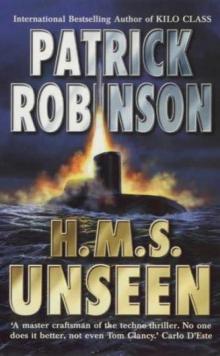 H.M.S. Unseen am-3
H.M.S. Unseen am-3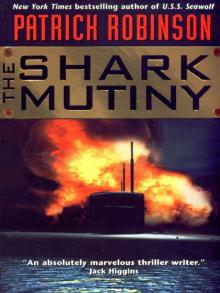 The Shark Mutiny (2001)
The Shark Mutiny (2001)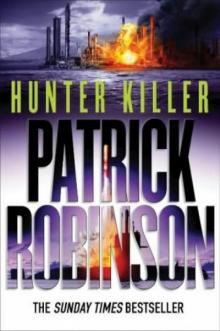 Hunter Killer am-8
Hunter Killer am-8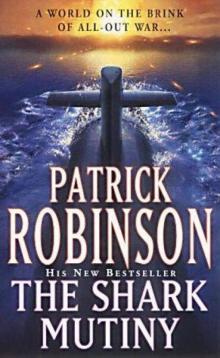 The Shark Mutiny am-5
The Shark Mutiny am-5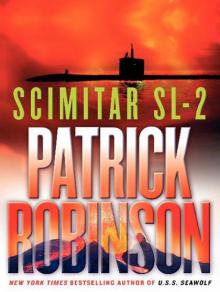 Scimitar SL-2
Scimitar SL-2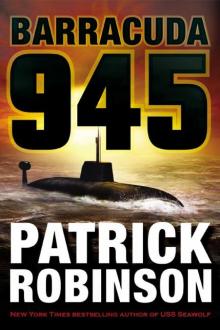 Barracuda 945 am-6
Barracuda 945 am-6 Hunter Killer
Hunter Killer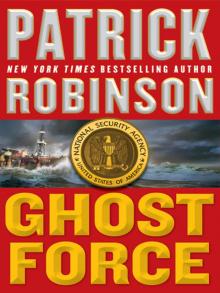 Ghost Force
Ghost Force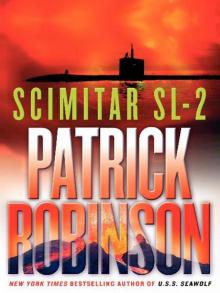 Scimitar SL-2 (2004)
Scimitar SL-2 (2004)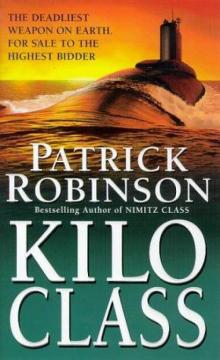 Kilo Class am-2
Kilo Class am-2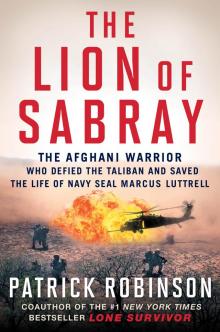 The Lion of Sabray
The Lion of Sabray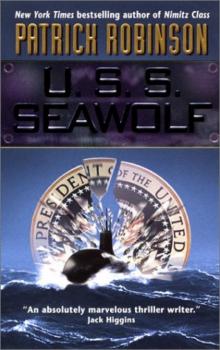 U.S.S. Seawolf am-4
U.S.S. Seawolf am-4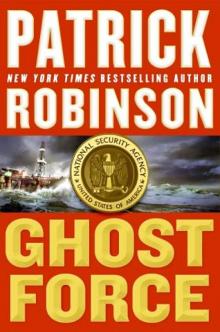 Ghost Force am-9
Ghost Force am-9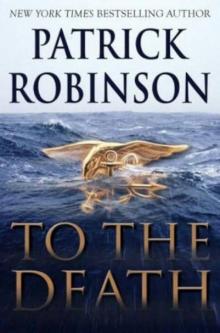 To the Death am-10
To the Death am-10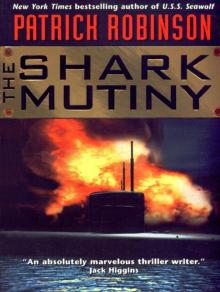 The Shark Mutiny
The Shark Mutiny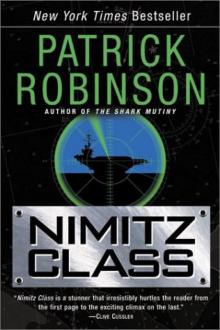 Nimitz Class am-1
Nimitz Class am-1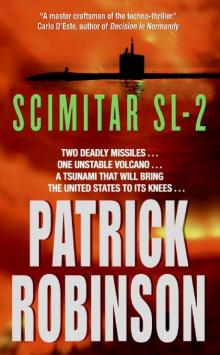 Scimitar SL-2 am-7
Scimitar SL-2 am-7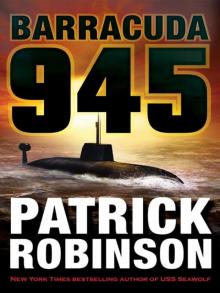 Barracuda 945
Barracuda 945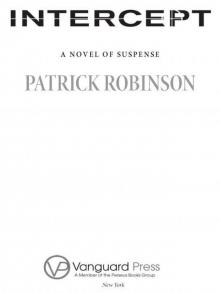 Intercept
Intercept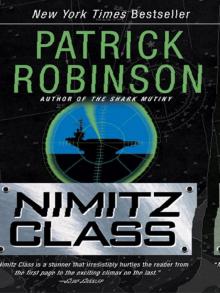 Nimitz Class (1997)
Nimitz Class (1997)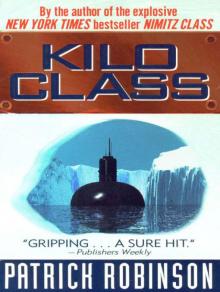 Kilo Class
Kilo Class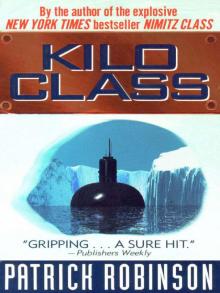 Kilo Class (1998)
Kilo Class (1998)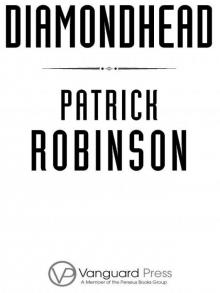 Diamondhead
Diamondhead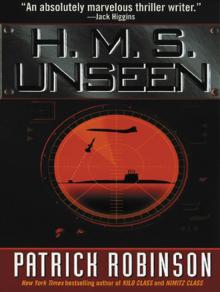 H.M.S. Unseen
H.M.S. Unseen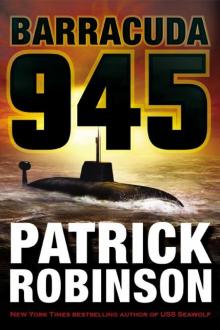 Barracuda 945 (2003)
Barracuda 945 (2003)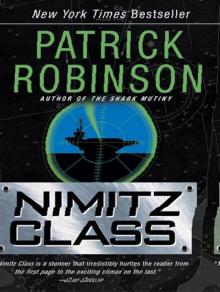 Nimitz Class
Nimitz Class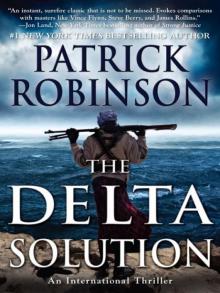 The Delta Solution
The Delta Solution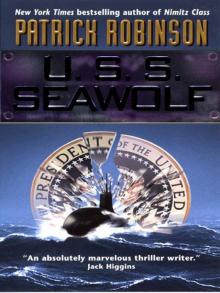 U.S.S. Seawolf
U.S.S. Seawolf